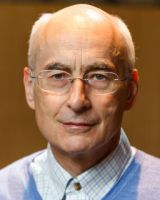Michael
Nussbaum
Professor
Mathematics
Michael Nussbaum is a professor of mathematics. His research program focuses on asymptotic methods in quantum statistics, in particular on hypothesis testing and discrimination between states of quantum systems. Further topics are the equivalence theory of statistical experiments, asymptotic inference in locally stationary time series and adaptive nonparametric hypothesis testing.
Publications
- Grama, I and Nussbaum, M., Asymptotic equivalence for nonparametric regression. Mathematical Methods of Statistics 11 (1) 1-36 (2002)
- Grama, I and Nussbaum, M., A functional Hungarian construction for sums of independent random variables. Annales de l'Institut Henri Poincare, Probabilites et Statistiques, 38 (6) pp. 923-957 (2002) pdf Based on the preprint A nonstandard Hungarian construction for partial sums. WIAS-preprint No. 324, 1997, Weierstrass Institute, Berlin
- Jaehnisch, M. and Nussbaum, M., Asymptotic equivalence for a model of independent non identically distributed observations. Statistics & Decisions 21 197-218 (2003)
- Nussbaum, M., Equivalence asymptotique des experiences statistiques. (Survey paper in French). Journal de la Societe francaise de Statistique 145 (1) 31-45 (2004)
- Jaehnisch, M. and Nussbaum, M., A functional Hungarian construction for the sequential empirical process, C.R. Acad. Sci. Paris, Ser. I 341 761-763 (2005)
- Audenaert, K. M. R., Nussbaum, M., Szkoła, A. and Verstraete, F., Asymptotic error rates in quantum hypothesis testing. Commun. Math. Phys. 279 (1) 251-283 (2008)
- Nussbaum, M. and Szkoła, A., The Chernoff lower bound for symmetric quantum hypothesis testing. Ann. Statist. 37 (2) 1040-1057 (2009)
- Golubev, G. K., Nussbaum, M. and Zhou, H. H., Asymptotic equivalence of spectral density estimation and Gaussian white noise, Ann. Statist. 38 (1) 181-214 (2010)
- Nussbaum, M. and Szkoła, A., Exponential error rates in multiple state discrimination on a quantum spin chain, J. Math. Phys. 51 072203 (2010)
- Nussbaum, M. and Szkoła, A., Asymptotically optimal discrimination between multiple pure quantum states. Submitted.



